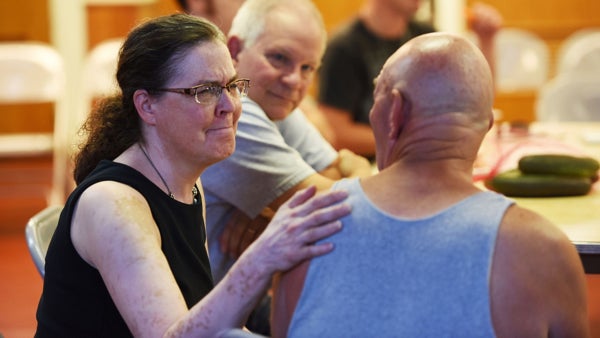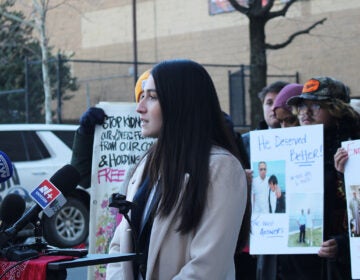Lancaster knows how to keep people out of jail, but it’s expensive
Listen
Mentor Frantz Herr (left) and returning citizen Isaac Rivera (right) have a discussion before the Lancaster County re-entry program at the Ebenezer Baptist Church Wednesday, Aug. 2, 2017, in Lancaster, Pennsylvania. (Bradley C. Bower/Philadelphia Inquirer)
After nearly two decades in prison, Isaac Rivera was ready to remake himself.
The 41-year-old from Lancaster served time after a 1997 arrest on assault and rape charges, but he felt that his violent past was behind him — if only he could find a way to jump-start his reinvention.
But then came a sign.
When he was released back in January, he remembers sitting in the waiting room at the Lancaster’s Probation and Parole Office.
“I saw a brochure, it said, ‘Just got out?’ And I pulled the brochure out, and, lo and behold, it talked about a support group for those who are returning citizens,” said Rivera, using the phrase for former inmates popular with advocacy groups.
At first, the pitch generated some conflicting feelings.
“As much as I was anxious to be free, I was also nervous coming into a environment I wasn’t aware of,” said Rivera.
Nonetheless, Rivera pushed aside his initial discomfort and attended the support group meeting in the quiet basement of a Lancaster church. He found community with a few dozen other people facing some of the same struggles he was confronting in trying to establish a new life from scratch.
“Over 20 years, a lot of stuff has been lost,” Rivera said. “So here’s the Catch-22: I need a state ID in order to get a birth certificate. I can’t get a birth certificate without an ID.”
Hearing of his quandary, those in the room who work with Lancaster’s Re-entry Management Organization — which organized the gathering — realized that they need to help Rivera sort this out. Before that, however, the other stories of struggle and frustration in the process of reinvention made Rivera feel less alone.
Melanie Snyder, who leads the re-entry coalition in Lancaster, said these kinds of conversations with those re-entering society led by former inmates helps Rivera and others feel more connected with the community.
“They are so few places where people who have been caught up in the criminal justice system can feel like their voices matters,” Snyder said. “So coming into that space every week where they know they will be accepted and welcomed and respected and loved is like this manna from heaven.”
Life training for former inmates
These twice-weekly sessions for ex-offenders are but a sliver of the services encompassed in an intensive program for ex-inmates in Lancaster that is stirring statewide conversation and prompting criminal justice advocates and county officials across the state to note the program’s impressive results.
Cities across Pennsylvania have grappled with trying to keep those leaving prison out of trouble with only mixed results.
More than four out of 10 inmates who are released from state custody end up reoffending or re-entering jail within the first year of their release, according to the Pennsylvania Department of Correction’s latest statistics.
The Lancaster model, called an intensive care-management program, has a recidivism rate of just 15 percent among former inmates who participate.
It’s kind of like life-training boot camp for ex-offenders. Those enrolled are set up with transitional housing. They have days full of job workshops on everything from personal finances to sprucing up a resume to learning how to talk about the offense that landed them behind bars. Each person is assigned a case manager, who monitors weekly goals. And probation and parole officials in Lancaster, usually on the opposite sides, are partners in the program.
“If you address the things, the need areas, that are making a client’s risk to recidivate higher, you reduce that individual’s risk level. You, by definition, make that community safer,” said Mark Wilson, who leads Lancaster County Adult Probation & Parole Services.
Top probation officials usually focus on law enforcement, not the human services. But Wilson said he believes in a balance.
So much so, that the Lancaster’s re-entry organization is housed in the same building as probation’s intake unit. That’s where a just-released person makes his first stop, once out of jail. The re-entry coalition’s location, Wilson emphasized, “is no accident.”
Returning to a private bathroom, other conveniences
From there, those who enter the intensive program might meet Doug Hopwood.
He helps the formerly incarcerated find living situations. Giving a tour of a downtown Lancaster housing site in a former hotel called TLC, Hopwood notes a detail in the college dorm-style rooms that most people would gloss over: a private bathroom.
“You’re coming out of prison, and you have your own bathroom, it’s a pretty big deal,” Hopwood said. “You want to get down to Maslow’s lower level. Yeah, there’s definitely some things we all take for granted.”
There’s a fair amount of supervision when living in one of the 52 spots at TLC. For instance, those staying there, once they find jobs, are charged a small amount of rent that goes up over time. They have to keep their quarters spic and span. And they have to be civil neighbors. Hopwood said these goals help people transition out smoothly.
“Landlords care about three things,” Hopwood said. “They care about paying your rent on time, keeping your place clean and being a good neighbor, which are the three things that we monitor here. So, when it comes to talking to that landlord, and advocating for that person, we can do that with a clear conscience, because we’ve been doing that the whole time.”
But before the ex-offenders can start paying a little rent, they need to find a job. For that, they’ll walk to a program called Career Link. Brooklyn native Rolando Ponce is a supervisor there.
He said, it is more than just learning how to put together a resume and helping connect former inmates with employers. They are sharpening their skills in those areas, but they’re also learning what he calls soft skills.
“If you’re currently out of prison, and you’re going to an interview, don’t go in anything that’s ripped, stained or dirty. We want you to look presentable,” Ponce said. “So we’ll put you in slacks, dress shirt, or even a suit, if you want. We have all that here. We try to be a one-stop-shop. And not offer every solution, but do as much as we can.”
Ponce said not everybody gets it right away, yet there’s a point he likes to emphasize with them.
“Do you want to keep repeating the same cycle? Or do you want to break that cycle?”
 Mentor Melanie Snyder (left) offers support to an unidentified returning citizen before the Lancaster County re-entry program in Lancaster, Pennsylvania. Mentor Frantz Herr (center) looks on. (Bradley C. Bower/Philadelphia Inquirer)
Mentor Melanie Snyder (left) offers support to an unidentified returning citizen before the Lancaster County re-entry program in Lancaster, Pennsylvania. Mentor Frantz Herr (center) looks on. (Bradley C. Bower/Philadelphia Inquirer)
Officials in Lancaster have learned that winding up back in a jail cell often is triggered by something little, small hiccups that should have been avoidable.
Like missing a payment on court fines and fees, which can cause a probation violation. And that could send someone back in.
So here’s the solution Lancaster officials devised.
Once someone gets into the intensive program, the fines and fees former inmates usually must start paying right away are put on hold for six months. So, if someone owes $2,000 in court fees once released, they don’t have to start chipping away at it right away.
Top probation official Wilson agreed to this grace period after advocates pushed for it.
“They still owe that $2,000, whether they start paying it this month, and they struggle, and they fail, and they’re back in jail in September,” he said. “Or we give them six months to let them get back on their feet,” Wilson said.
Snyder of the re-entry group agrees with having the grace period.
“When you have someone who has no income, they’re struggling to find a job, they’re struggling to even get food. And then you tell them, ‘by the way, if you don’t pay $50 a month toward fines and costs, you can be locked back up, or you can have your food stamps shut off,’ that just enormous stress,” she said.
But the program serves very few people; last year, just 52 former inmates participated. Most of them stayed out of trouble. But it was expensive.
Snyder’s re-entry group has an annual budget of about $175,000, but even maintaining that level in the future is now in question.
Lancaster looks for some outside help
For the first time, Lancaster County commissioners are putting out a request for proposals for some of the county’s re-entry services. Florida-based GEO Group is expected to be among those hoping to take over services for former inmates.
“We would have to go to other avenues of funding and other partners to work with if the county commissioners end up working with a for-profit entity,” said Snyder.
Snyder contends that her group is already saving taxpayers. The intensive program she oversees costs about $29 per person, per day, compared with the $71 a day that officials say it costs to keep an inmate behind bars in Lancaster.
“Just start multiplying,” she said. “If they weren’t in the intensive program, they could be committing new crimes and sitting in Lancaster County Prison.”
Key to the intensive program’s success is that it serves a select population of the formerly incarcerated. More than two-thirds of those who apply are accepted, but they have to know of the program’s existence. And once they apply, usually while still serving a sentence, they are vetted.
Snyder said when she interviews applicants, she listens carefully to hear if the person has the right attitude to give the program a shot.
“It’s someone at medium to high risk of recidivism, with lots of needs, little or nothing in the way of resources — but is wanting to make a change,” she said.
Back to Rivera, who served 20 years. He has had a strong will to set his life straight for a while, but even still, he said the programs as part of the Re-entry Management Organization, or the RMO, have helped him stay focused on hard days.
“Self-determination is just like a gas tank. It does run empty. So without the RMO, without career links, I would’ve folded a long time ago,” he said.
When Rivera counsels other former inmates about transitioning into society, he tells them to be ready for adversity.
“If you’re not personally ready, mentally and emotionally ready, to withstand the obstacles, the hardships, the pitfalls, the setbacks. And I tell them from experience, there’s going to be a lot of nos,” he said.
Pennsylvania Attorney General Josh Shapiro and Gov. Tom Wolf recently launched a statewide council on prisoner re-entry, and Lancaster’s program was touted as a model that could be instructive to counties statewide.
Would it work in Philadelphia?
In Philadelphia, Ceciley Bradford-Jones is the executive director of the Mayor’s Office of Re-entry program.
“Lancaster’s model is phenomenal. It is one that’s probably going to be mimicked throughout the country,” Bradford-Jones said.
Philadelphia is 26 times the size of the City of Lancaster, with tens of thousands more people being released from prison every year.
But Bradford-Jones said Lancaster has created a model where all the players have a very specific role, and even law enforcement has a hand in helping former inmates restart their lives.
She said Philadelphia officials should study the Lancaster model, because even if it’s serving a limited group, the program has brought about meaningful behavior changes. And that’s no small feat.
Julie Wertheimer, who is Philadelphia’s chief of staff of criminal justice, said the city’s dozens of service providers can be an obstacle in trying to get them all under one umbrella, as Lancaster has managed to do.
Philadelphia does have programs — including some supported by a MacArthur Foundation grant aimed at cutting the city’s prison population — that have helped former inmates stay on the right track. Sometimes, however, the number of providers offering the same services can be daunting.
“There is a lot of conversation about how we can streamline the services and have people access them in an easier fashion,” she said.
Being the poorest big city in America makes re-entry work in Philadelphia a singular task, said Wertheimer.
“So many of the challenges that people trying to re-enter face stem from or relate to poverty and lack of economic opportunity,” she said.
This piece was produced by the Inquirer, the Daily News, Philly.com and WHYY for The Reentry Project, a citywide collaborative news initiative on the challenges facing people returning from prison, and what can be done about them. Allyn’s reporting is the first in the Project’s What Works series, stories on reentry best practices from around the country.
WHYY is your source for fact-based, in-depth journalism and information. As a nonprofit organization, we rely on financial support from readers like you. Please give today.




